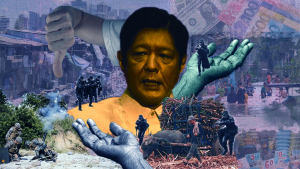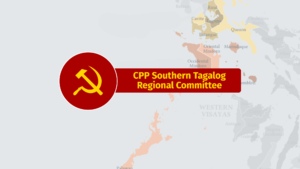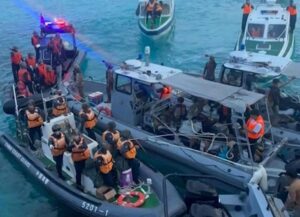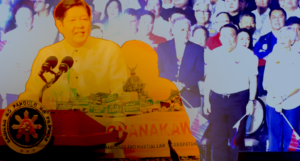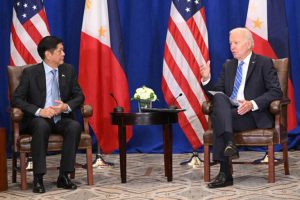Oppose US war agitation and uphold peaceful resolution of maritime disputes with China

Download: PDF
The Filipino people face threats to the nation’s sovereignty and security amid continuing maritime disputes in the West Philippine Sea and increasingly aggressive and hostile acts of China. But the even bigger threat to the country’s sovereignty and security is how the Marcos regime is allowing the US government and military to use the Philippines as springboard for war provocations and war preparations against imperialist rival China.
To defend their sovereignty and security, it is imperative for the Filipino people to oppose the continuing build-up of US-led foreign military forces in the West Philippine Sea and South China Sea and increasing presence of US troops and weapons systems in military bases in the Philippines, while calling upon China to abide by the 2016 ruling of the International Arbitral Tribunal (IAT) and assert the peaceful resolution of disputes through dialogue. They must oppose rising anti-Chinese rhetoric in public discourse leading to Sinophobia, and US-instigated war-mongering, all of which make any peaceful resolution of conflicts impossible or very difficult.
The Party calls on the Filipino people to reject the militarist perspective being promoted by the US imperialists, the Marcos regime and its armed forces, as well as by pro-US sycophants, that conflicts in the West Philippine Sea can be resolved only or primarily through military might. They portray the Filipino people as helpless without US protection–grossly distorting or ommitting historical facts how the US colonized and continue to dominate the country to make it economically, politically and militarily dependent on the US.
We must have a firm grasp of the history and the different aspects that make up the current questions in order to have a clear view of the path of struggle to defend the country’s sovereignty amid the rising inter-imperialist conflict.
1. The intensifying conflicts between the Philippines and China are closely linked to the US military build-up in the Asia-Pacific in recent years in line with its imperialist geopolitical strategy to contain the growth of China’s economic and military power. The trade, economic and diplomatic contradictions between the US and China, both imperialist powers, continue to heighten, in the face of the global economic crisis, and the US imperialists’ desire to push back China’s growing global power in order to expand and monopolize its spheres of influence and investments.
In 2011, the US government declared its “pivot to Asia” strategy to shift the main emphasis of its foreign deployment of troops from Afghanistan to the what it termed as the “Indo-Pacific” region (from India to Australia). Since then, the US has increased its presence along China’s eastern and southern coasts, in the so-called first-island chain from the Kuril Islands at the northern tip of Japan, to the Korean peninsula, Taiwan, the Philippines and Borneo, although this was delayed somewhat by their inability to withdraw from Afghanistan until 2021.
The US concept of the first-island chain is a key element of its so-called Indo-Pacific strategy. According to US military officers themselves, the build-up of US military forces, particularly supporting calls for Taiwan’s “independence,” is aimed at forcing or provoking China “to own the starting pistol.” The US is also stoking maritime conflicts in the South China Sea. The US plans to further strengthen its presence at its military bases in Japan, and is investing in expanding its military bases in Korea. In 2014, the US forged the Enhanced Defense Cooperation Agreement (EDCA) with the Philippines to allow it to build military bases facilities inside the camps of the Armed Forces of the Philippines (AFP).
Part of the US “pivot to Asia” strategy has been extending military aid to the Philippines through such US programs as Foreign Military Financing, Foreign Military Sales, Excess Defense Articles and Foreign Assistance Act. In particular, funding was allotted for the transfer of naval ships to strengthen “interoperability” of the Philippines with the naval vessels to be deployed by the US to the region. Since 2011, the US has transferred at least six small naval vessels (cutters) to the Philippines, including the BRP Gregorio del Pilar, the BRP Ramon Alcaraz, the BRP Andres Bonifacio and the BRP Apolinario Mabini. Several more are set to be transferred in the coming years.
As in many other parts of the world, the US is determined to ignite an armed conflict in the Asia-Pacific in order to satiate its war obsession, extend its hegemony, expand its economic power and satisfy the profit-hungry arms industry. To justify their objective of increasing American military presence in the region, the US imperialists and its allies are fanning the disputes between the Philippines and China.
The recent Balikatan war exercises served to escalate military tensions in the South China Sea. The US led naval forces from France, Australia, Japan and the Philippines to conduct so-called “joint maritime patrols” in the South China Sea, purportedly as part of “freedom of navigation” operations, but with the declared militarist objective of serving as “deterrence” to China. These foreign naval forces have remained in the area for other so-called war exercises. From Palawan and Ilocos Norte, the US carried out live fire exercises using its HIMARS to launch rockets to the sea in the direction of China, and against a “Chinese-made” ship supposedly to represent an “imaginary enemy.”
2. The maritime disputes between the Philippines and China have intensified over the past decade, as a result of China’s push-back against US military pressure. In line with its security plan to expand and secure its strategic space, China has repeatedly trampled on Philippine sovereign and economic rights, and has veered towards more antagonism.
In 2012, while Balikatan exercises were being held, the Philippine military deployed its then newly-acquired BRP Gregorio del Pilar to the Scarborough Shoal to stop a Chinese vessel from fishing in the area. This led to a two-month stand off after China deployed at least two maritime surveillance ships to the area to block the Philippine military. Under a US-brokered “gentleman’s agreement,” the Philippines withdrew its vessels from the area, but which was not reciprocated by China. China has since maintained its looming presence in the area, hampering access for Filipino fisherfolk.
In 2013, around a year after the US declared its “pivot to Asia,” China started building military facilities in the Spratly islands. To justify its actions, China has made over-extended claims over the entire South China Sea using its so-called nine-dash line map, in which parts of the territorial waters of the Philippines, as well as Vietnam, Malaysia, Brunei and Indonesia were included. In the next few years, China built seven facilities in these marine formations in the Spratly Islands, which parts fall under the Philippine’s exclusive economic zone.
In 2016, the International Arbitral Tribunal, the body that settles disputes under the United Nations Convention on the Laws of the Seas (UNCLOS), issued its decision in favor of the Philippines in the case it filed in 2013 questioning China’s nine-dash line claims. The IAT dismissed China’s territorial claims over the South China Sea, and defined the coverage of the Philippine territorial waters, exclusive economic zone and extended continental shelf. Among others, it declared that three of the Chinese facilities constructed at the Fiery Cross Reef, Subi Reef and Mischief Reef, are within the Philippine exclusive economic zone. It determined the Scarborough Shoal to be not within the exclusive economic zone of any country, but declared it as a common fishing ground where fishing rights of Filipino fisherfolk, as well as Chinese, should be respected.
China has resorted to bullying and increasingly hostile acts against the Philippines in the South China Sea, using its vast numbers of maritime vessels to carry out swarming tactics, blocking maneuvers, hampering access to fishing grounds, water bombing of Philippine vessels, industrial harvesting of fish, and destruction of marine resources within Philippine waters.
Last year, China stepped up its aggression when it twice water-bombed Philippine Coast Guard vessels sending supplies to the Philippine naval vessel BRP Sierra Madre, that has been stranded at the Ayungin Shoal. The Chinese government claims the supply mission operations to the Ayungin Shoal violated a secret “gentleman’s agreement” which the Duterte regime entered into during its term, under which no construction materials will be brought to reinforce the stranded naval vessel. China also claims that the operations violate a “new model” deal with the commander of the AFP’s Western Command, who was said to have agreed with knowledge of Marcos officials.
China has further heightened its hostile acts when it water-bombed Philippine maritime vessels patrolling the Scarborough Shoal, and when it issued threats to arrest, starting June 15, foreigners who will “trespass” in the waters which it is claiming without basis.
3. The increasing hostility of China to the Philippines is a shift from the long history of socio-economic, cultural and diplomatic relations and peaceful coexistence between the two countries, under which marine territory and fishing grounds have been mostly shared by their fisherfolk as well as from different countries. China has become increasingly antagonistic to the Filipino people since emerging as an imperialist power in the late 2000s.
Contradictions between China and the Filipino people intensified under the previous Duterte regime. To ingratiate himself to China, Duterte threw aside the 2016 ruling of the International Arbitral Tribunal and kowtowed to China’s imperial overlordship of the South China Sea, in exchange for promises of political support and a pledge to invest large amounts of money to Philippine infrastructure projects. Duterte turned a blind eye to how China refused to withdraw its domineering presence in the Scarborough Shoal, despite promises that Filipino fisherfolk will not be impeded from fishing in the area. Despite Duterte’s obsequiousness to China, the US government continued to strengthen its ties with the AFP providing it with a least $600 million from 2016 to 2022, and intensified naval operations in the Philippines and nearby seas.
China has become increasingly and overtly hostile over the past year as the Marcos regime strengthened its collusion with the US plans of expanding its military presence, in exchange for US military and political support. Since 2022, the Marcos regime has allowed the US to expand its presence in and around the Philippines, and preposition war matériel and troops in reportedly 17 sites around the country, including nine officially acknowledged “agreed locations” under the EDCA.
Goaded by its US military advisers, the Marcos regime, through the AFP and the Philippine Coast Guard, has carried out since early 2023 increasingly aggressive operations in the West Philippine Sea. On several occasions, the Philippine Coast Guard conducted “supply missions” to the Ayungin Shoal carrying construction materials for the BRP Sierra Madre, with a clear aim of provoking China, whose ships responded with blocking maneuvers and water bombing of the Philippine vessels.
Marcos also recently entered into a “trilateral alliance” with the US and Japan, which denounced the “dangerous and aggressive behavior” of China in the South China Sea.
Despite having declared his intention of finding “a more peaceful road” in resolving conflicts with China, Marcos and his officers continue to agitate his military forces to prepare against “an external threat,” with a clear reference to China. Marcos continues to push Philippine naval and maritime vessels to carry out more operations that aggravate tensions with China.
Marcos has failed to prioritize diplomatic and political channels, as well as legal steps to assert the country’s rightful claims in the West Philippine Sea, as affirmed by the 2016 decision of the IAT. Legal observers point out to how the Philippine government has wasted its 2016 IAT victory, with zero efforts to pursue claims for damages against China in proper international courts.
4. Over the past few months, we have observed a clearly concerted campaign to raise a Chinese specter to manipulate the mindset of Filipinos and fuel Sinophobia. Commodore Jay Tarriela, who recently underwent training in Washington sponsored by the US Embassy, is leading the pack with his non-stop loquacious anti-Chinese tirades. Daily news reports have been swamped with news and commentary that tend to rouse negative public sentiments against China. Some well-meaning individuals and organizations are falling into the US war agitation.
These include the media-hype over the supposed “alarming increase” of “thousands” of Chinese students in Cagayan province (who some claim might be “spies”) which was later belied by the schools and even by government agencies. Top officers of the AFP also made recent claims that China was recruiting among military generals to raise suspicions of espionage. Marcos, himself, publicly claimed that there are attempts at “infiltration” by foreign powers. They conveniently omit the fact that top officers of the AFP have long received indoctrination and training from the US, and that US military officers have long served as advisers of the AFP.
The illegal and criminal activities being carried out behind the façade of the so-called “Philippine Offshore Gaming Operations” or POGOs, the investments of which have been encouraged by the Philippine government, have also been hyped to fuel anti-China sentiments. The brouhaha over the supposed involvement of Bamban, Tarlac Mayor Alice Guo in illegal POGO operations has been used to fuel speculations that she is a Chinese “spy.”
Recently, Philippine news media hyped public claims made by Philippine government officials, even without direct evidence, that China was behind the pile of dead corals found dumped at Escoda Shoal, the nearest maritime feature to Palawan. These are the same military officers and government officials who, just a few weeks earlier, were awestruck by the massive bombings and rocket firing into Philippine waters carried out by the US military during the recent Balikatan war exercises, oblivious to the gross impact on the environment, marine life and livelihood of people.
5. The Filipino people aspire genuine national freedom, and peace and security amid rising inter-imperialist conflicts. In pursuit of these aspirations, they must condemn US imperialism for taking advantage of the Philippine’s maritime conflicts with China to drag the Philippines into its war provocations and preparations against its imperialist rival China. At the same time, they must push China to respect the 2016 ruling of the International Arbitral Tribunal, and actively seek dialogue and the peaceful resolution of maritime conflicts.
The Filipino people must oppose imperialist and proxy war at all costs, denounce US imperialist military intervention and war-mongering, demand the withdrawal of all US military forces in the country’s land and marine territory, and fight the Marcos regime’s subservience to US geopolitical strategy that prevent the peaceful resolution of conflicts.
In particular, the Filipino people must demand the dismantling of all US military bases and facilities in the Philippines, including those officially declared under the EDCA, as well as other secret US military facilities, and the removal of all US weapons prepositioned therein.
They must actively push for the demilitarization of the West Philippine Sea, including the withdrawal of all naval vessels of the US and its allies, as well as all Chinese Coast Guard ships and maritime vessels, from Philippine territorial waters, exclusive economic zone and extended continental shelf, and the dismantling of all military facilities of China in the Spratly Islands.
They must call upon the international community to condemn the US, France, Australia and Japan for military intervention and heightening military tensions in the region.
In relation to maritime conflicts with China, the Filipino people should actively call for dialogue and peaceful resolution of disputes between the Philippines and China in line with the 2016 ruling of the International Arbitral Tribunal. They must urge unity among neighboring countries around the South China Sea, and call on the United Nations and other international bodies to press China’s compliance with the ruling in line with UNCLOS, to which it is a signatory and party.
They can pursue claims for damages before foreign or international courts to make China pay for the destruction to the marine environment caused by their land reclamation, construction of military facilities and industrial fisshing, and for the use since 2013 of its military facilities at the Fiery Cross Reef, Subi Reef and Mischief Reef.
The Filipino people must also demand China to stop using aggressive force against civilians, especially small fisherfolk, withdraw its armed vessels and industrial fishing boats in the Scarborough Shoal, and respect the rights of Filipinos and other nationals to carry out traditional fishing within the grounds. They must denounce China’s unlawful and imperialist order to arrest fishermen in its claimed waters within the West Philippine Sea and demand its immediate rescinding.
They must promote amity and peaceful coexistence between the Philippines and China, denounce the Marcos government for pursuing war as an instrument of national policy, and failing to pursue a peaceful resolution to conflicts with China. They must also demand China to unequivocally declare that it has no intention of employing armed force against the Philippines.
The Party calls on the Filipino people to build a broad united front and unite all patriotic organizations, institutions and individuals who aspire genuine national freedom, oppose imperialist war and proxy wars, and desire peaceful resolution of conflicts among countries.
The Filipino people must intensify their resistance to US imperialist domination in the Philippines, and military intervention and war agitation. The Party calls on all sectors to support the armed struggle being waged by the New People’s Army against the fascist instruments of US imperialism that are at the behest of US war provocations. Waging armed resistance against the puppet army of the US is critical contribution to efforts to prevent the outbreak of an inter-imperialist war.
The Filipino people must establish solidarity relations with peoples around the world, including the American and Chinese people, to pursue common aspirations for peace and ending inter-imperialist wars or imperialist-instigated wars. They must unite to demand the US to stop fuelling and prolonging the wars in Ukraine, Gaza and other parts of the world, which imperil the lives, freedom and security of all peoples.

